Moudle2 Public holidays词汇短语句型精讲 课件(50张PPT)
文档属性
| 名称 | Moudle2 Public holidays词汇短语句型精讲 课件(50张PPT) | 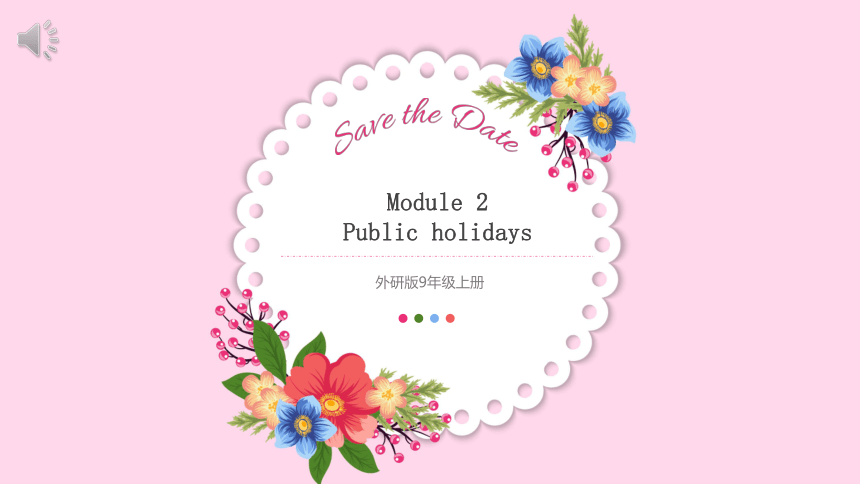 | |
| 格式 | pptx | ||
| 文件大小 | 15.6MB | ||
| 资源类型 | 教案 | ||
| 版本资源 | 外研版 | ||
| 科目 | 英语 | ||
| 更新时间 | 2021-07-21 08:07:26 | ||
图片预览

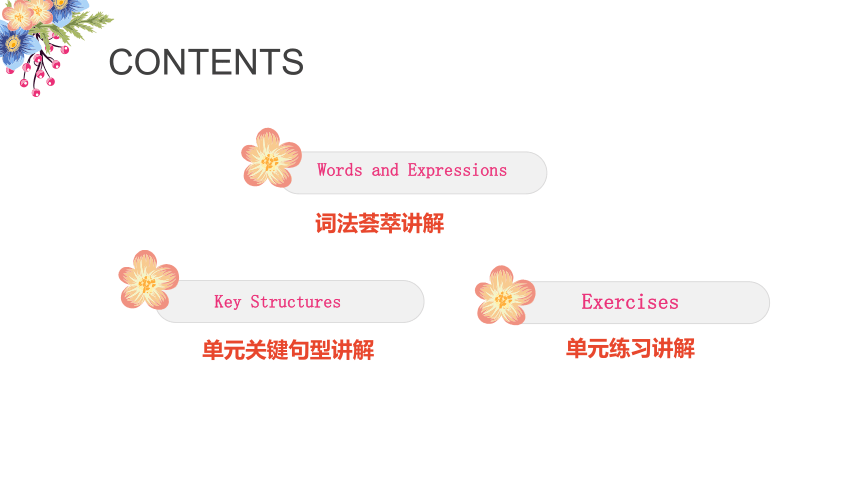
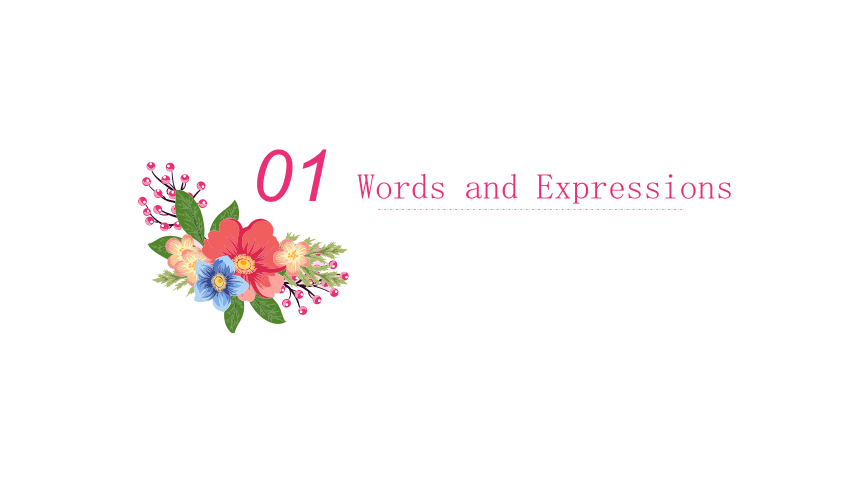
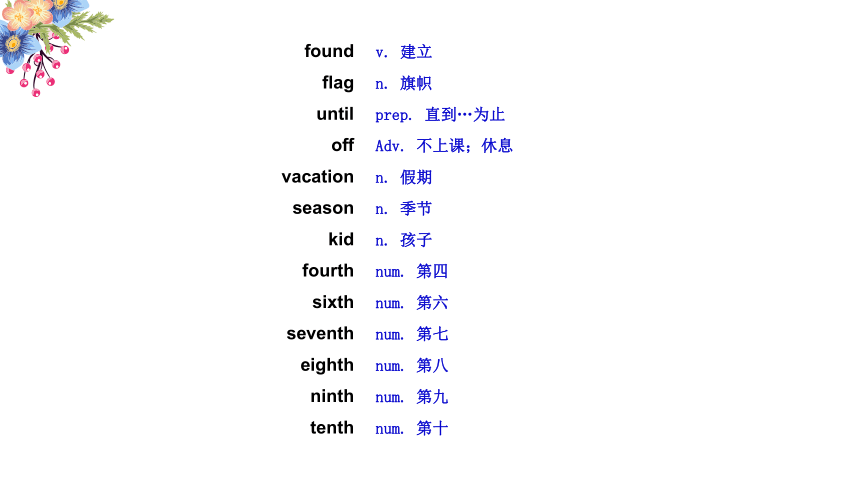
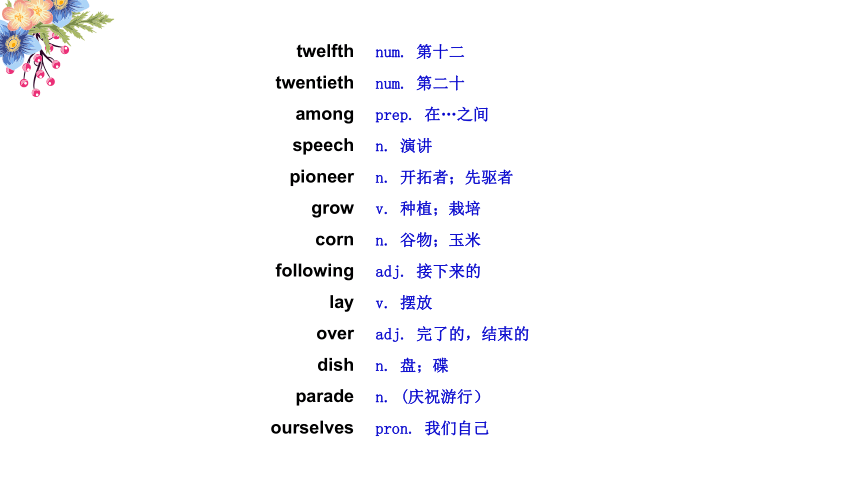
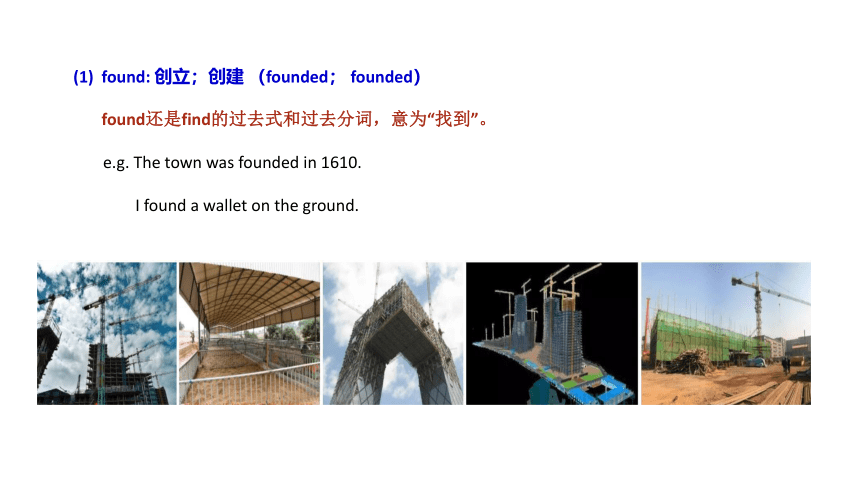
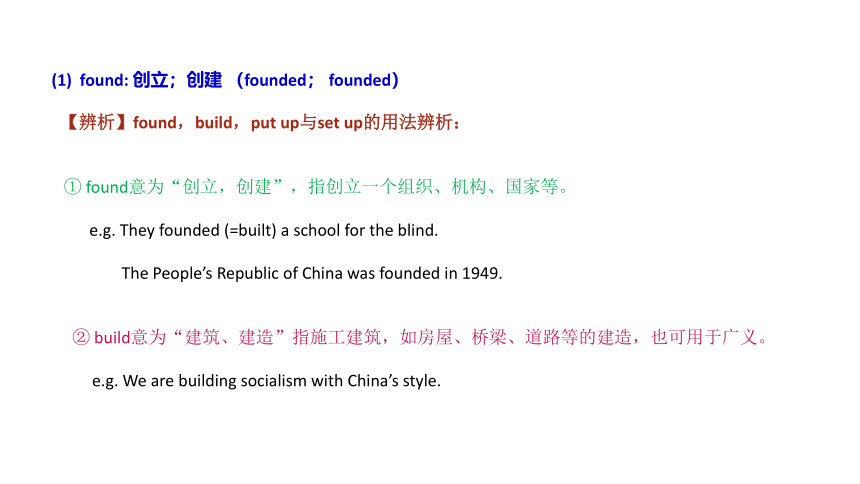
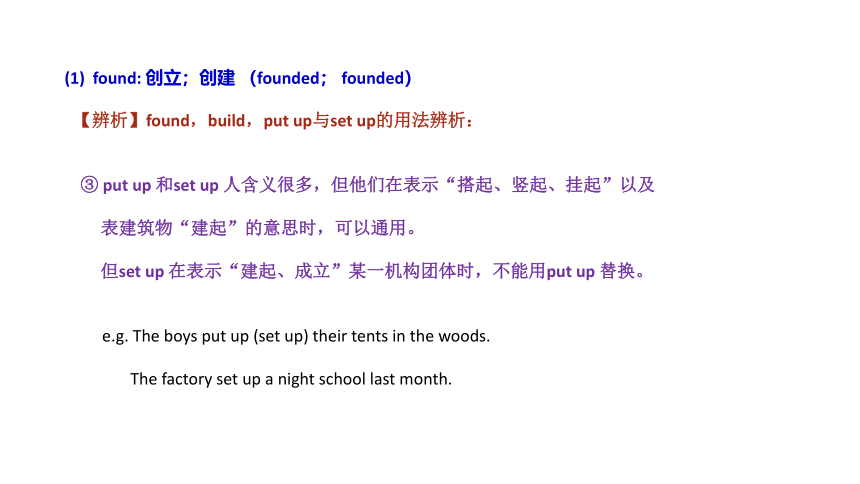
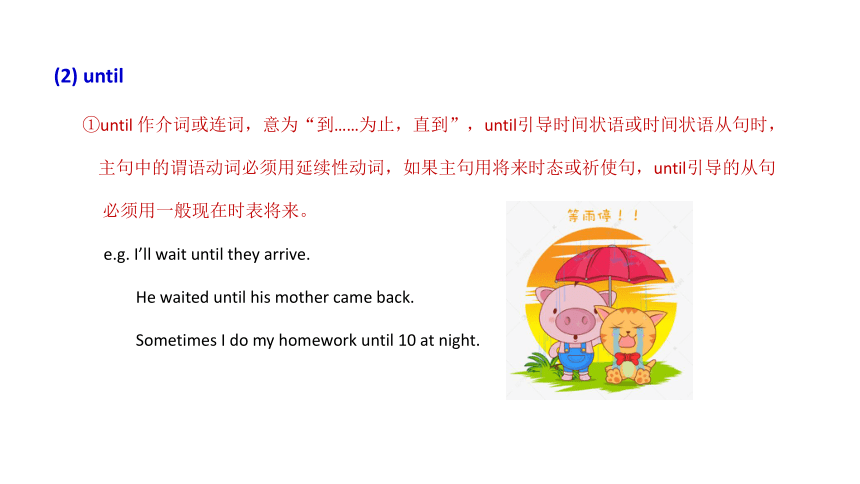
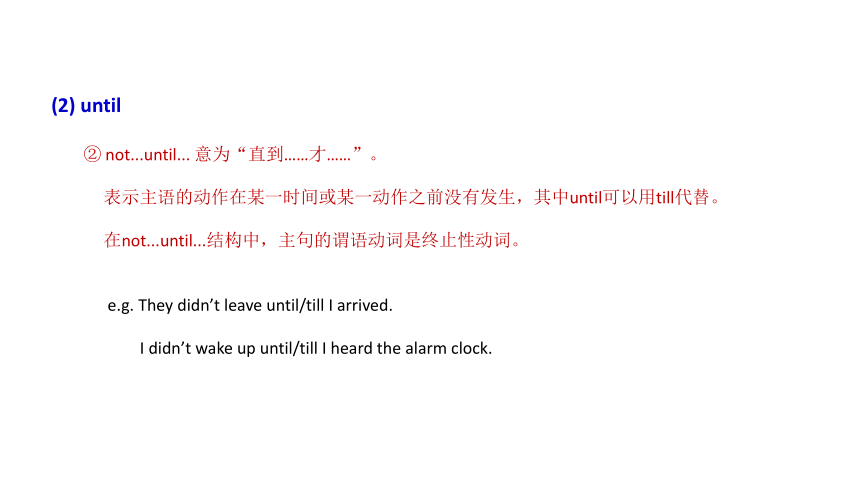
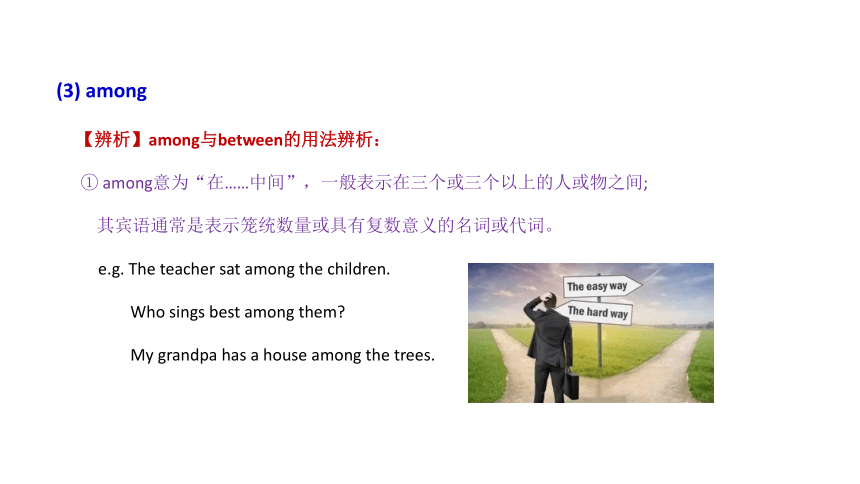
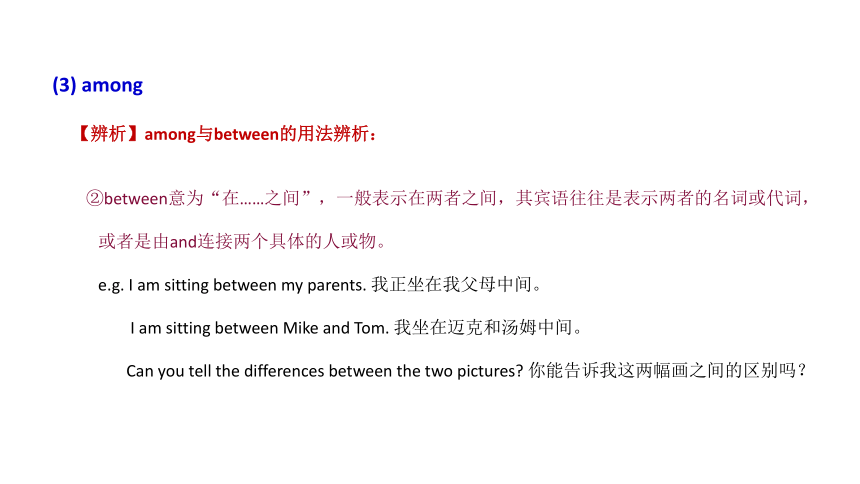
文档简介
(共50张PPT)
Module 2
Public holidays
外研版9年级上册
词法荟萃讲解
Words and Expressions
单元关键句型讲解
Key Structures
CONTENTS
Exercises
单元练习讲解
01
Words and Expressions
found
flag
until
off
vacation
season
kid
fourth
sixth
seventh
eighth
ninth
tenth
v. 建立
n. 旗帜
prep. 直到…为止
Adv. 不上课;休息
n. 假期
n. 季节
n. 孩子
num. 第四
num. 第六
num. 第七
num. 第八
num. 第九
num. 第十
twelfth
twentieth
among
speech
pioneer
grow
corn
following
lay
over
dish
parade
ourselves
num. 第十二
num. 第二十
prep. 在…之间
n. 演讲
n. 开拓者;先驱者
v. 种植;栽培
n. 谷物;玉米
adj. 接下来的
v. 摆放
adj. 完了的,结束的
n. 盘;碟
n. (庆祝游行)
pron. 我们自己
found: 创立;创建 (founded; founded)
found还是find的过去式和过去分词,意为“找到”。
e.g. The town was founded in 1610.
I found a wallet on the ground.
found: 创立;创建 (founded; founded)
【辨析】found,build,put up与set up的用法辨析:
① found意为“创立,创建”,指创立一个组织、机构、国家等。
e.g. They founded (=built) a school for the blind.
The People’s Republic of China was founded in 1949.
② build意为“建筑、建造”指施工建筑,如房屋、桥梁、道路等的建造,也可用于广义。
e.g. We are building socialism with China’s style.
found: 创立;创建 (founded; founded)
【辨析】found,build,put up与set up的用法辨析:
③ put up 和set up 人含义很多,但他们在表示“搭起、竖起、挂起”以及
表建筑物“建起”的意思时,可以通用。
但set up 在表示“建起、成立”某一机构团体时,不能用put up 替换。
e.g. The boys put up (set up) their tents in the woods.
The factory set up a night school last month.
(2) until
①until 作介词或连词,意为“到……为止,直到”,until引导时间状语或时间状语从句时,
主句中的谓语动词必须用延续性动词,如果主句用将来时态或祈使句,until引导的从句
必须用一般现在时表将来。
e.g. I’ll wait until they arrive.
He waited until his mother came back.
Sometimes I do my homework until 10 at night.
(2) until
② not...until... 意为“直到……才……”。
表示主语的动作在某一时间或某一动作之前没有发生,其中until可以用till代替。
在not...until...结构中,主句的谓语动词是终止性动词。
e.g. They didn’t leave until/till I arrived.
I didn’t wake up until/till I heard the alarm clock.
(3) among
【辨析】among与between的用法辨析:
① among意为“在……中间”,一般表示在三个或三个以上的人或物之间;
其宾语通常是表示笼统数量或具有复数意义的名词或代词。
e.g. The teacher sat among the children.
Who sings best among them
My grandpa has a house among the trees.
(3) among
【辨析】among与between的用法辨析:
②between意为“在……之间”,一般表示在两者之间,其宾语往往是表示两者的名词或代词,
或者是由and连接两个具体的人或物。
e.g. I am sitting between my parents. 我正坐在我父母中间。
I am sitting between Mike and Tom. 我坐在迈克和汤姆中间。
Can you tell the differences between the two pictures 你能告诉我这两幅画之间的区别吗?
(4) following: 接下来;接下来的
e.g. the following year= the next year意为“第二年,接下来的一年”;
following是形容词,意为“接下来的,接着的,下列/面的”,常用来作定语。
其动词形式为follow,意为“跟上”。
e.g. I will use the following model.
Can you name the following things in English
(5) lay (laid; laid) 摆放餐桌
lay the table意为“摆设桌子”。
lay是动词,意为“摆放(餐桌),其过去式为laid;过去分词为laid。
e.g. My mother asked me to lay the table for dinner.
(5) lay (laid; laid) 摆放餐桌
【拓展】巧记lie,lay众兄弟:规则的撒谎,不规则的躺;躺过就下蛋,下蛋不规则。
lie→lied→lied→lying撒谎;说谎;
lie→lay→lain→lying躺;位于;
lay→laid→laid→laying下蛋;产卵。
e.g. The hen laid an egg this morning.
He lay on the bed, listening to his favourite music.
The man lying there lied that he had laid the money on the table.
(6) over: adj 完了的;结束的
be over意为“完成,结束”,over是形容词,意为“完了的;结束的”。
e.g. Is the meeting over
Class is over.
since then
sll kinds of
take a vacation
have fun
as soon as
lay the table
public holiday
May Day/ Labour Day
National Day
自从那时起
各种各样的
度假
玩得开心
一…就…
放置桌子
公众假期
劳动节
国庆节
be founded
a three-day holiday
have one day off
something special
have a picnic
watch sb. do sth.
make short speeches
give thanks for...
come together
plenty of
被建立
一个三天的假期
请一天假
一些特别的事情
野餐
看某人做某事
做简短的演讲
因…而感谢
聚在一起
许多
enjoy oneself
make a lot of progress
get out of bed
in different ways
fall asleep
count down
depend on
apart from
过得开心
取得很大进步
起床
用不同的方式
入睡
倒数
取决于
除…之外
是现在完成时的标志。since作介词或连词,意为“自从;自……以来”,后面接表示
时间的词或短语,引导时间状语从句,主句用现在完成时,而且谓语动词须是延
续性动词。
e.g. We have been friends since childhood. 我们从小就一直是朋友。
He has lived in Beijing since then. 从那以后他就一直住在北京。
Since we came here, we have lived in the house.
自从我们来这儿,我们就住在这座房子里。
since then: 从那以后
【拓展】since还可以意为“既然……”,引导原因状语从句,表示原因是对方已知的,
相当于now that,语气比because弱。
e.g. Since the rain has stopped, let’s go for a walk. 既然雨停了,我们出去散散步吧。
since then: 从那以后
all kinds of: 各种各样的
all kinds of: 各种各样的
kind是可数名词,意为“种类”,相当于type或者sort。
与kind有关的短语:
many kinds of许多种类的;
a kind of 一种;
different kinds of 不同种类的;
of a kind同一种类的。
e.g. There are all kinds of animals in the zoo. 动物园里有各种各样的动物。
You can taste all kinds of delicious food. 你能品尝各种各样美味的食物。
all kinds of: 各种各样的
【拓展】kind of意为“有点”,其后常常跟形容词。
e.g. I’m kind of hungry. Could you give me some food
我有点饿了。你能给我一些食物吗?
as soon as:一…就…
1) 引导时间状语从句,强调两个动作接连发生,从句中的谓语动词常为短暂性动词;
2) as soon as引导从句时,如果主句用将来时态或祈使句,从句常用一般现在时表将来。
e.g. Please call me as soon as you get to the hotel.
If it doesn’t rain, we will have a picnic tomorrow.
We’ll go back to school as soon as the May Day holiday is over.
As soon as his father went out, the boy ran to the cinema.
02
Key structures
【辨析】in,on与at表示时间的用法辨析:
① on用在具体的某一天(如星期、日期或节日)或者某一天的上午、下午或晚上前。
e.g. on Monday;on the morning of June 1st;on a cold day;on Monday;
on July 1st;on Sunday morning 等。
② in用在世纪,季节,年,月,周或某一日中的上午、下午、晚上前。
e.g. in summer;in 2013;in May;in winter;in the morn ing;in the afternoon;
in the evening;in three days等。
The People’s Republic of China was founded on 1st October 1949.
中华人民共和国成立于1949年10月1日。
【辨析】in,on与at表示时间的用法辨析:
③at用在某个时刻(几点钟)或黎明、正午、黄昏、午夜前。
e.g. at 7:00;at dawn;at noon;at dusk;at midnight等。
【拓展】this, that, last, next, every, yesterday, tomorrow等词用在morning, afternoon,
night及星期的七个词前一律不能加介词。
e.g. I went to Hangzhou last Sunday. 我上周去了杭州
The People’s Republic of China was founded on 1st October 1949.
中华人民共和国成立于1949年10月1日。
While we’re staying with our friends, we’re going to spend one day in Qingdao. 和朋友们在一起期间,我们会去青岛玩一天。
【辨析】while,when与as的用法辨析:
① while作连词,意为“当……的时候”,引导时间状语从句, 强调某一段时间内主从句动作同
时发生,或主句动作在从句持续过程中的某一时刻发生,且从句的谓语动词应该是延续
性动词或表示状态的词;
while还可用作并列连词,意为“而,然而”,表示对比(照)。
e.g. While she was listening to the radio, she fell asleep.
She fell asleep while she was reading the newspaper.
My father was cleaning the car while I was playing computer games.
I am fond of English while he likes maths.
Some people waste food while others haven’t enough to eat.
While we’re staying with our friends, we’re going to spend one day in Qingdao. 和朋友们在一起期间,我们会去青岛玩一天。
【辨析】while,when与as的用法辨析:
② when作连词,意为“当……的时候,从……时候起”,引导时间状语从句,可接“时间点” 和“时间段”,从句中的谓语动词既可是终止性动词,也可以是延续性动词。当主句用一般将来时态时,从句用一般现在时。
e.g. When I got home, my family were already having dinner.
When they were still talking and laughing, the teacher came in.
I’m going to be a teacher when I grow up.
While we’re staying with our friends, we’re going to spend one day in Qingdao. 和朋友们在一起期间,我们会去青岛玩一天。
【辨析】while,when与as的用法辨析:
③ as作连词,意为“当……的时候”,可接“时间点”和“时间段”,从句中的谓语动词既可
是终止性动词,也可以是延续性动词,但不能用be动词或表示“感觉、理解、知道等”这
类动词。
e.g. As I left the house I remembered the key. 当我离开房间的时候,我想起了钥匙。
1) take a vacation 意为“去度假”,相当于have a vacation,其中vacation是名词,意为“假期,假日”。
e.g. He will take a vacation next week.
Watertown is a great place for families to take/have a vocation.
It’s the start of the vacation season and most people take a vacation sometime in July or August. 这个时间是休假季节的开始,大多数人都会在七月或八月的某段时间休假。
【辨析】vocation,holiday,festival与leave的用法辨析:
① vocation意为“假期”,指正式规定的假期或指学习或工作中一段长时间的休息。
至于寒、暑假,英国人喜欢用summer/winter holidays,美国人喜欢用summer/winter vocation,区别不大。
e.g. My dad is now on holiday/vocation in Beijing.
We spent our summer holidays/vocation in the countryside this year.
② holiday意为“假日,休息日”,指国家法定的或因风俗习惯而形成的节假日,一般
表示时间可长可短的假期,为可数名词,与季节连用时多用复数,与数词连用时表示
次数。
e.g. New Year’s Day is a national holiday in China.
It’s the start of the vacation season and most people take a vacation sometime in July or August. 这个时间是休假季节的开始,大多数人都会在七月或八月的某段时间休假。
【辨析】vocation,holiday,festival与leave的用法辨析:
③ festival意为“节日”,指具有悠久历史的传统节日或持续一段时间的文娱活动。
e.g. I go to Beijing at Spring Festival every year.
This city has a music festival every summer.
④ leave意为“请假”,被批准后离开自己的工作的一段时间。
e.g. He stays at home on sick leave.
He asked for a six months’ leave.
It’s the start of the vacation season and most people take a vacation sometime in July or August. 这个时间是休假季节的开始,大多数人都会在七月或八月的某段时间休假。
【辨析】sometimes,sometime,some times和some time的用法辨析:
① sometimes是副词,意为“有时候,间或”,用来描述现在或过去常发生的事情。
e.g. Lucy goes to school on foot, but sometimes by bike.
② sometime意为“某时”,指某一不明确的时间,可用于过去时或将来时。
e.g. Kate will be back sometime in February.
It’s the start of the vacation season and most people take a vacation sometime in July or August. 这个时间是休假季节的开始,大多数人都会在七月或八月的某段时间休假。
【辨析】sometimes,sometime,some times和some time的用法辨析:
③ some times意为“几次,几倍”,是名词短语。
e.g. Our school is some times larger than theirs.
④ some time意为“一段时间”,是名词短语,也可表达sometime的意义。
e.g. I’ll stay here for some time.
【拓展】请记住下面口诀:分开是“一段”,相连为“某时”。分开s是“倍、次”,相连s是“有时”。
It’s the start of the vacation season and most people take a vacation sometime in July or August. 这个时间是休假季节的开始,大多数人都会在七月或八月的某段时间休假。
【辨析】watch sb. do sth.与watch sb. doing sth.的用法辨析:
① watch sb. do sth. 意为“观看某人做某事”。强调观看了事情的全过程,动作已经结
束,或“观看某人经常做某事”,是省略to的动词不定式作宾语补足语。
类似用法的有see/hear/notice sb. do sth.等。
e.g. I heard her sing.
I saw him get on the bus.
It’s always interesting to watch other people show their talents.
We also watch bands play music in public parks. 我们也可以在公园里观看乐队演奏乐曲。
【辨析】watch sb. do sth.与watch sb. doing sth.的用法辨析:
② watch sb. doing sth. 意为“观看某人正在做某事”。强调观看的动作正在进行,
此处是现在分词作宾语补足语。类似用法的有see/hear/notice sb. doing sth.等。
e.g. I’m watching them playing football.
I saw him getting on the bus.
I heard her singing.
We also watch bands play music in public parks. 我们也可以在公园里观看乐队演奏乐曲。
It is a time for... 意为“是一个……的时刻”,是一个固定句式。
It is time for sth.=It is time to do sth.=It is time for sb. to do sth.意为“是做某事的时候了,做
某事的时间到了”。
It’s a time for celebration. 这是一个庆祝的时刻。
It’s time for lunch.=It’s time to have lunch. 吃午饭的时间到了。
It’s a time for children to show thanks to their mothers. 这是孩子向他们的妈妈表达感谢的时刻。
It is a time for a special dinner among family and friends. 它是家人和朋友共进特殊晚餐的时刻。
【辨析】fall asleep,go to bed,go to sleep与be asleep的用法辨析:
① fall asleep意为“睡着”,表示睡着的动作过程,侧重于“自然而然地入睡”,有时也含有“不想入睡而入睡”之意,不可以和表示一段时间的时间状语连用。
e.g. One after another, all three of them fell asleep.
He fell asleep when there was a loud knock at the door.
② go to bed指“就寝”,只表示“上床去睡”这一动作,无“睡着”之意,它的对应词组 是get up“起床”。
e.g. I often go to bed early.
What time did you go to bed last night
They would like to come before they fall asleep, so they can see him.
他们希望他在他们睡着之前就来,这样他们就可以见到他。
【辨析】fall asleep,go to bed,go to sleep与be asleep的用法辨析:
③ go to sleep表动作,意为“入睡,设法睡着”,强调进入睡眠状态。
e.g. He found it difficult to go to sleep.
I don’t know when I went to sleep last night.
④be asleep表状态,意为“睡着的,睡熟的”,可以和表示一段时间的时间状语连用。
e.g. The baby has been asleep for an hour.
Now my brother is asleep. Please be quiet.
They would like to come before they fall asleep, so they can see him.
他们希望他在他们睡着之前就来,这样他们就可以见到他。
apart from意为“除……以外(别无) (=except);除……外(还有)(=besides),此外”。
e.g. Apart from his schoolwork, he takes interest in anything.
Is there any other girl who wants to go with me apart from Amy
Apart from Independence Day, Labour Day and Thanksgiving, the US has several other important holidays during the year. 除了独立日、劳动节和感恩节,美国在一年中还有其他几个重要的节日。
03
Exercise
1.--What day is the ____ day of the week
--It’s Friday.
A. fifth B. Five C. Six D. Sixth
2. --When ______ China _______
--______ October 1st ,1949.
A. did, found, on B. Was, founded, on C. Did, found, in D. Was, founded, in
3. --We’ll have a _______ holiday.
--Really That sounds great.
A. 3 days B. 3day’s C. 3--day D. 3---day’s
4. --Who _______ last term
--It was Mr. Smith.
A. taught you English B. taught your English
C. teaches you English D. teaches your English
5. Could you please tell me ___________
A. how can I download music from the Internet B. how to download music from the Internet
C. How to do D. What to do that
6.--How long have you studied English at this school
--__________.
A. Since two years. B. Since two years ago C. Since I get here D. Since last year ago
7.--I’m really tiered out.
--Why not go _________ to have a rest
A. somewhere relaxing B. anywhere relaxing C. somewhere relaxed D. anywhere relaxed
8.Don’t eat ________ meat. It’s ______ bad for your health.
A. too much, too much B. much too, too much C. too many, much too D. too much, much too
9.—Please tell him the news as soon as he ________ back. ---Sure.
A. come B. comes C. will come D. came
10. –Where do you think the tea ________ --Of course in China.
A. invented B. did invent C. was invented D. will invent
11--.How did they celebrate Mary’s birthday ---By _______ a birthday party.
A. having B. had C. has D. to have
12.—How long did you ______ writing the novel --About three months.
A. spend B. cost C. take D. pay
13. I usually watch the boy ______ basketball on the playground. He plays really well.
A. to play B. playing C. play D. plays
14. Don’t get off the bus ______ it stops.
A. until B. after C. as soon as D. while
15. _____the boy was ill, he was absent (缺席)from the party.
A. As soon as B. Because of C. Since D. when
1.--What day is the ____ day of the week
--It’s Friday.
A. fifth B. Five C. Six D. Sixth
2. --When ______ China _______
--______ October 1st ,1949.
A. did, found, on B. Was, founded, on C. Did, found, in D. Was, founded, in
3. --We’ll have a _______ holiday.
--Really That sounds great.
A. 3 days B. 3day’s C. 3--day D. 3---day’s
4. --Who _______ last term
--It was Mr. Smith.
A. taught you English B. taught your English
C. teaches you English D. teaches your English
D
B
C
A
5. Could you please tell me ___________
A. how can I download music from the Internet B. how to download music from the Internet
C. How to do D. What to do that
6.--How long have you studied English at this school
--__________.
A. Since two years. B. Since two years ago C. Since I get here D. Since last year ago
7.--I’m really tiered out.
--Why not go _________ to have a rest
A. somewhere relaxing B. anywhere relaxing C. somewhere relaxed D. anywhere relaxed
8.Don’t eat ________ meat. It’s ______ bad for your health.
A. too much, too much B. much too, too much C. too many, much too D. too much, much too
B
B
A
D
9.—Please tell him the news as soon as he ________ back. ---Sure.
A. come B. comes C. will come D. came
10. –Where do you think the tea ________ --Of course in China.
A. invented B. did invent C. was invented D. will invent
11--.How did they celebrate Mary’s birthday ---By _______ a birthday party.
A. having B. had C. has D. to have
12.—How long did you ______ writing the novel --About three months.
A. spend B. cost C. take D. pay
13. I usually watch the boy ______ basketball on the playground. He plays really well.
A. to play B. playing C. play D. plays
14. Don’t get off the bus ______ it stops.
A. until B. after C. as soon as D. while
15. _____the boy was ill, he was absent (缺席)from the party.
A. As soon as B. Because of C. Since D. when
B
C
A
A
C
A
C
感谢您的观看
Module 2
Public holidays
外研版9年级上册
词法荟萃讲解
Words and Expressions
单元关键句型讲解
Key Structures
CONTENTS
Exercises
单元练习讲解
01
Words and Expressions
found
flag
until
off
vacation
season
kid
fourth
sixth
seventh
eighth
ninth
tenth
v. 建立
n. 旗帜
prep. 直到…为止
Adv. 不上课;休息
n. 假期
n. 季节
n. 孩子
num. 第四
num. 第六
num. 第七
num. 第八
num. 第九
num. 第十
twelfth
twentieth
among
speech
pioneer
grow
corn
following
lay
over
dish
parade
ourselves
num. 第十二
num. 第二十
prep. 在…之间
n. 演讲
n. 开拓者;先驱者
v. 种植;栽培
n. 谷物;玉米
adj. 接下来的
v. 摆放
adj. 完了的,结束的
n. 盘;碟
n. (庆祝游行)
pron. 我们自己
found: 创立;创建 (founded; founded)
found还是find的过去式和过去分词,意为“找到”。
e.g. The town was founded in 1610.
I found a wallet on the ground.
found: 创立;创建 (founded; founded)
【辨析】found,build,put up与set up的用法辨析:
① found意为“创立,创建”,指创立一个组织、机构、国家等。
e.g. They founded (=built) a school for the blind.
The People’s Republic of China was founded in 1949.
② build意为“建筑、建造”指施工建筑,如房屋、桥梁、道路等的建造,也可用于广义。
e.g. We are building socialism with China’s style.
found: 创立;创建 (founded; founded)
【辨析】found,build,put up与set up的用法辨析:
③ put up 和set up 人含义很多,但他们在表示“搭起、竖起、挂起”以及
表建筑物“建起”的意思时,可以通用。
但set up 在表示“建起、成立”某一机构团体时,不能用put up 替换。
e.g. The boys put up (set up) their tents in the woods.
The factory set up a night school last month.
(2) until
①until 作介词或连词,意为“到……为止,直到”,until引导时间状语或时间状语从句时,
主句中的谓语动词必须用延续性动词,如果主句用将来时态或祈使句,until引导的从句
必须用一般现在时表将来。
e.g. I’ll wait until they arrive.
He waited until his mother came back.
Sometimes I do my homework until 10 at night.
(2) until
② not...until... 意为“直到……才……”。
表示主语的动作在某一时间或某一动作之前没有发生,其中until可以用till代替。
在not...until...结构中,主句的谓语动词是终止性动词。
e.g. They didn’t leave until/till I arrived.
I didn’t wake up until/till I heard the alarm clock.
(3) among
【辨析】among与between的用法辨析:
① among意为“在……中间”,一般表示在三个或三个以上的人或物之间;
其宾语通常是表示笼统数量或具有复数意义的名词或代词。
e.g. The teacher sat among the children.
Who sings best among them
My grandpa has a house among the trees.
(3) among
【辨析】among与between的用法辨析:
②between意为“在……之间”,一般表示在两者之间,其宾语往往是表示两者的名词或代词,
或者是由and连接两个具体的人或物。
e.g. I am sitting between my parents. 我正坐在我父母中间。
I am sitting between Mike and Tom. 我坐在迈克和汤姆中间。
Can you tell the differences between the two pictures 你能告诉我这两幅画之间的区别吗?
(4) following: 接下来;接下来的
e.g. the following year= the next year意为“第二年,接下来的一年”;
following是形容词,意为“接下来的,接着的,下列/面的”,常用来作定语。
其动词形式为follow,意为“跟上”。
e.g. I will use the following model.
Can you name the following things in English
(5) lay (laid; laid) 摆放餐桌
lay the table意为“摆设桌子”。
lay是动词,意为“摆放(餐桌),其过去式为laid;过去分词为laid。
e.g. My mother asked me to lay the table for dinner.
(5) lay (laid; laid) 摆放餐桌
【拓展】巧记lie,lay众兄弟:规则的撒谎,不规则的躺;躺过就下蛋,下蛋不规则。
lie→lied→lied→lying撒谎;说谎;
lie→lay→lain→lying躺;位于;
lay→laid→laid→laying下蛋;产卵。
e.g. The hen laid an egg this morning.
He lay on the bed, listening to his favourite music.
The man lying there lied that he had laid the money on the table.
(6) over: adj 完了的;结束的
be over意为“完成,结束”,over是形容词,意为“完了的;结束的”。
e.g. Is the meeting over
Class is over.
since then
sll kinds of
take a vacation
have fun
as soon as
lay the table
public holiday
May Day/ Labour Day
National Day
自从那时起
各种各样的
度假
玩得开心
一…就…
放置桌子
公众假期
劳动节
国庆节
be founded
a three-day holiday
have one day off
something special
have a picnic
watch sb. do sth.
make short speeches
give thanks for...
come together
plenty of
被建立
一个三天的假期
请一天假
一些特别的事情
野餐
看某人做某事
做简短的演讲
因…而感谢
聚在一起
许多
enjoy oneself
make a lot of progress
get out of bed
in different ways
fall asleep
count down
depend on
apart from
过得开心
取得很大进步
起床
用不同的方式
入睡
倒数
取决于
除…之外
是现在完成时的标志。since作介词或连词,意为“自从;自……以来”,后面接表示
时间的词或短语,引导时间状语从句,主句用现在完成时,而且谓语动词须是延
续性动词。
e.g. We have been friends since childhood. 我们从小就一直是朋友。
He has lived in Beijing since then. 从那以后他就一直住在北京。
Since we came here, we have lived in the house.
自从我们来这儿,我们就住在这座房子里。
since then: 从那以后
【拓展】since还可以意为“既然……”,引导原因状语从句,表示原因是对方已知的,
相当于now that,语气比because弱。
e.g. Since the rain has stopped, let’s go for a walk. 既然雨停了,我们出去散散步吧。
since then: 从那以后
all kinds of: 各种各样的
all kinds of: 各种各样的
kind是可数名词,意为“种类”,相当于type或者sort。
与kind有关的短语:
many kinds of许多种类的;
a kind of 一种;
different kinds of 不同种类的;
of a kind同一种类的。
e.g. There are all kinds of animals in the zoo. 动物园里有各种各样的动物。
You can taste all kinds of delicious food. 你能品尝各种各样美味的食物。
all kinds of: 各种各样的
【拓展】kind of意为“有点”,其后常常跟形容词。
e.g. I’m kind of hungry. Could you give me some food
我有点饿了。你能给我一些食物吗?
as soon as:一…就…
1) 引导时间状语从句,强调两个动作接连发生,从句中的谓语动词常为短暂性动词;
2) as soon as引导从句时,如果主句用将来时态或祈使句,从句常用一般现在时表将来。
e.g. Please call me as soon as you get to the hotel.
If it doesn’t rain, we will have a picnic tomorrow.
We’ll go back to school as soon as the May Day holiday is over.
As soon as his father went out, the boy ran to the cinema.
02
Key structures
【辨析】in,on与at表示时间的用法辨析:
① on用在具体的某一天(如星期、日期或节日)或者某一天的上午、下午或晚上前。
e.g. on Monday;on the morning of June 1st;on a cold day;on Monday;
on July 1st;on Sunday morning 等。
② in用在世纪,季节,年,月,周或某一日中的上午、下午、晚上前。
e.g. in summer;in 2013;in May;in winter;in the morn ing;in the afternoon;
in the evening;in three days等。
The People’s Republic of China was founded on 1st October 1949.
中华人民共和国成立于1949年10月1日。
【辨析】in,on与at表示时间的用法辨析:
③at用在某个时刻(几点钟)或黎明、正午、黄昏、午夜前。
e.g. at 7:00;at dawn;at noon;at dusk;at midnight等。
【拓展】this, that, last, next, every, yesterday, tomorrow等词用在morning, afternoon,
night及星期的七个词前一律不能加介词。
e.g. I went to Hangzhou last Sunday. 我上周去了杭州
The People’s Republic of China was founded on 1st October 1949.
中华人民共和国成立于1949年10月1日。
While we’re staying with our friends, we’re going to spend one day in Qingdao. 和朋友们在一起期间,我们会去青岛玩一天。
【辨析】while,when与as的用法辨析:
① while作连词,意为“当……的时候”,引导时间状语从句, 强调某一段时间内主从句动作同
时发生,或主句动作在从句持续过程中的某一时刻发生,且从句的谓语动词应该是延续
性动词或表示状态的词;
while还可用作并列连词,意为“而,然而”,表示对比(照)。
e.g. While she was listening to the radio, she fell asleep.
She fell asleep while she was reading the newspaper.
My father was cleaning the car while I was playing computer games.
I am fond of English while he likes maths.
Some people waste food while others haven’t enough to eat.
While we’re staying with our friends, we’re going to spend one day in Qingdao. 和朋友们在一起期间,我们会去青岛玩一天。
【辨析】while,when与as的用法辨析:
② when作连词,意为“当……的时候,从……时候起”,引导时间状语从句,可接“时间点” 和“时间段”,从句中的谓语动词既可是终止性动词,也可以是延续性动词。当主句用一般将来时态时,从句用一般现在时。
e.g. When I got home, my family were already having dinner.
When they were still talking and laughing, the teacher came in.
I’m going to be a teacher when I grow up.
While we’re staying with our friends, we’re going to spend one day in Qingdao. 和朋友们在一起期间,我们会去青岛玩一天。
【辨析】while,when与as的用法辨析:
③ as作连词,意为“当……的时候”,可接“时间点”和“时间段”,从句中的谓语动词既可
是终止性动词,也可以是延续性动词,但不能用be动词或表示“感觉、理解、知道等”这
类动词。
e.g. As I left the house I remembered the key. 当我离开房间的时候,我想起了钥匙。
1) take a vacation 意为“去度假”,相当于have a vacation,其中vacation是名词,意为“假期,假日”。
e.g. He will take a vacation next week.
Watertown is a great place for families to take/have a vocation.
It’s the start of the vacation season and most people take a vacation sometime in July or August. 这个时间是休假季节的开始,大多数人都会在七月或八月的某段时间休假。
【辨析】vocation,holiday,festival与leave的用法辨析:
① vocation意为“假期”,指正式规定的假期或指学习或工作中一段长时间的休息。
至于寒、暑假,英国人喜欢用summer/winter holidays,美国人喜欢用summer/winter vocation,区别不大。
e.g. My dad is now on holiday/vocation in Beijing.
We spent our summer holidays/vocation in the countryside this year.
② holiday意为“假日,休息日”,指国家法定的或因风俗习惯而形成的节假日,一般
表示时间可长可短的假期,为可数名词,与季节连用时多用复数,与数词连用时表示
次数。
e.g. New Year’s Day is a national holiday in China.
It’s the start of the vacation season and most people take a vacation sometime in July or August. 这个时间是休假季节的开始,大多数人都会在七月或八月的某段时间休假。
【辨析】vocation,holiday,festival与leave的用法辨析:
③ festival意为“节日”,指具有悠久历史的传统节日或持续一段时间的文娱活动。
e.g. I go to Beijing at Spring Festival every year.
This city has a music festival every summer.
④ leave意为“请假”,被批准后离开自己的工作的一段时间。
e.g. He stays at home on sick leave.
He asked for a six months’ leave.
It’s the start of the vacation season and most people take a vacation sometime in July or August. 这个时间是休假季节的开始,大多数人都会在七月或八月的某段时间休假。
【辨析】sometimes,sometime,some times和some time的用法辨析:
① sometimes是副词,意为“有时候,间或”,用来描述现在或过去常发生的事情。
e.g. Lucy goes to school on foot, but sometimes by bike.
② sometime意为“某时”,指某一不明确的时间,可用于过去时或将来时。
e.g. Kate will be back sometime in February.
It’s the start of the vacation season and most people take a vacation sometime in July or August. 这个时间是休假季节的开始,大多数人都会在七月或八月的某段时间休假。
【辨析】sometimes,sometime,some times和some time的用法辨析:
③ some times意为“几次,几倍”,是名词短语。
e.g. Our school is some times larger than theirs.
④ some time意为“一段时间”,是名词短语,也可表达sometime的意义。
e.g. I’ll stay here for some time.
【拓展】请记住下面口诀:分开是“一段”,相连为“某时”。分开s是“倍、次”,相连s是“有时”。
It’s the start of the vacation season and most people take a vacation sometime in July or August. 这个时间是休假季节的开始,大多数人都会在七月或八月的某段时间休假。
【辨析】watch sb. do sth.与watch sb. doing sth.的用法辨析:
① watch sb. do sth. 意为“观看某人做某事”。强调观看了事情的全过程,动作已经结
束,或“观看某人经常做某事”,是省略to的动词不定式作宾语补足语。
类似用法的有see/hear/notice sb. do sth.等。
e.g. I heard her sing.
I saw him get on the bus.
It’s always interesting to watch other people show their talents.
We also watch bands play music in public parks. 我们也可以在公园里观看乐队演奏乐曲。
【辨析】watch sb. do sth.与watch sb. doing sth.的用法辨析:
② watch sb. doing sth. 意为“观看某人正在做某事”。强调观看的动作正在进行,
此处是现在分词作宾语补足语。类似用法的有see/hear/notice sb. doing sth.等。
e.g. I’m watching them playing football.
I saw him getting on the bus.
I heard her singing.
We also watch bands play music in public parks. 我们也可以在公园里观看乐队演奏乐曲。
It is a time for... 意为“是一个……的时刻”,是一个固定句式。
It is time for sth.=It is time to do sth.=It is time for sb. to do sth.意为“是做某事的时候了,做
某事的时间到了”。
It’s a time for celebration. 这是一个庆祝的时刻。
It’s time for lunch.=It’s time to have lunch. 吃午饭的时间到了。
It’s a time for children to show thanks to their mothers. 这是孩子向他们的妈妈表达感谢的时刻。
It is a time for a special dinner among family and friends. 它是家人和朋友共进特殊晚餐的时刻。
【辨析】fall asleep,go to bed,go to sleep与be asleep的用法辨析:
① fall asleep意为“睡着”,表示睡着的动作过程,侧重于“自然而然地入睡”,有时也含有“不想入睡而入睡”之意,不可以和表示一段时间的时间状语连用。
e.g. One after another, all three of them fell asleep.
He fell asleep when there was a loud knock at the door.
② go to bed指“就寝”,只表示“上床去睡”这一动作,无“睡着”之意,它的对应词组 是get up“起床”。
e.g. I often go to bed early.
What time did you go to bed last night
They would like to come before they fall asleep, so they can see him.
他们希望他在他们睡着之前就来,这样他们就可以见到他。
【辨析】fall asleep,go to bed,go to sleep与be asleep的用法辨析:
③ go to sleep表动作,意为“入睡,设法睡着”,强调进入睡眠状态。
e.g. He found it difficult to go to sleep.
I don’t know when I went to sleep last night.
④be asleep表状态,意为“睡着的,睡熟的”,可以和表示一段时间的时间状语连用。
e.g. The baby has been asleep for an hour.
Now my brother is asleep. Please be quiet.
They would like to come before they fall asleep, so they can see him.
他们希望他在他们睡着之前就来,这样他们就可以见到他。
apart from意为“除……以外(别无) (=except);除……外(还有)(=besides),此外”。
e.g. Apart from his schoolwork, he takes interest in anything.
Is there any other girl who wants to go with me apart from Amy
Apart from Independence Day, Labour Day and Thanksgiving, the US has several other important holidays during the year. 除了独立日、劳动节和感恩节,美国在一年中还有其他几个重要的节日。
03
Exercise
1.--What day is the ____ day of the week
--It’s Friday.
A. fifth B. Five C. Six D. Sixth
2. --When ______ China _______
--______ October 1st ,1949.
A. did, found, on B. Was, founded, on C. Did, found, in D. Was, founded, in
3. --We’ll have a _______ holiday.
--Really That sounds great.
A. 3 days B. 3day’s C. 3--day D. 3---day’s
4. --Who _______ last term
--It was Mr. Smith.
A. taught you English B. taught your English
C. teaches you English D. teaches your English
5. Could you please tell me ___________
A. how can I download music from the Internet B. how to download music from the Internet
C. How to do D. What to do that
6.--How long have you studied English at this school
--__________.
A. Since two years. B. Since two years ago C. Since I get here D. Since last year ago
7.--I’m really tiered out.
--Why not go _________ to have a rest
A. somewhere relaxing B. anywhere relaxing C. somewhere relaxed D. anywhere relaxed
8.Don’t eat ________ meat. It’s ______ bad for your health.
A. too much, too much B. much too, too much C. too many, much too D. too much, much too
9.—Please tell him the news as soon as he ________ back. ---Sure.
A. come B. comes C. will come D. came
10. –Where do you think the tea ________ --Of course in China.
A. invented B. did invent C. was invented D. will invent
11--.How did they celebrate Mary’s birthday ---By _______ a birthday party.
A. having B. had C. has D. to have
12.—How long did you ______ writing the novel --About three months.
A. spend B. cost C. take D. pay
13. I usually watch the boy ______ basketball on the playground. He plays really well.
A. to play B. playing C. play D. plays
14. Don’t get off the bus ______ it stops.
A. until B. after C. as soon as D. while
15. _____the boy was ill, he was absent (缺席)from the party.
A. As soon as B. Because of C. Since D. when
1.--What day is the ____ day of the week
--It’s Friday.
A. fifth B. Five C. Six D. Sixth
2. --When ______ China _______
--______ October 1st ,1949.
A. did, found, on B. Was, founded, on C. Did, found, in D. Was, founded, in
3. --We’ll have a _______ holiday.
--Really That sounds great.
A. 3 days B. 3day’s C. 3--day D. 3---day’s
4. --Who _______ last term
--It was Mr. Smith.
A. taught you English B. taught your English
C. teaches you English D. teaches your English
D
B
C
A
5. Could you please tell me ___________
A. how can I download music from the Internet B. how to download music from the Internet
C. How to do D. What to do that
6.--How long have you studied English at this school
--__________.
A. Since two years. B. Since two years ago C. Since I get here D. Since last year ago
7.--I’m really tiered out.
--Why not go _________ to have a rest
A. somewhere relaxing B. anywhere relaxing C. somewhere relaxed D. anywhere relaxed
8.Don’t eat ________ meat. It’s ______ bad for your health.
A. too much, too much B. much too, too much C. too many, much too D. too much, much too
B
B
A
D
9.—Please tell him the news as soon as he ________ back. ---Sure.
A. come B. comes C. will come D. came
10. –Where do you think the tea ________ --Of course in China.
A. invented B. did invent C. was invented D. will invent
11--.How did they celebrate Mary’s birthday ---By _______ a birthday party.
A. having B. had C. has D. to have
12.—How long did you ______ writing the novel --About three months.
A. spend B. cost C. take D. pay
13. I usually watch the boy ______ basketball on the playground. He plays really well.
A. to play B. playing C. play D. plays
14. Don’t get off the bus ______ it stops.
A. until B. after C. as soon as D. while
15. _____the boy was ill, he was absent (缺席)from the party.
A. As soon as B. Because of C. Since D. when
B
C
A
A
C
A
C
感谢您的观看
同课章节目录
- Module 1 Wonders of the world
- Unit 1 It's more than 2,000 years old.
- Unit 2 The Grand Canyon was not just big.
- Unit 3 Language in use
- Module 2 Public holidays
- Unit 1 My family always go somewhere interesting a
- Unit 2 We have celebrated the festival since the f
- Unit 3 Language in use
- Module 3 Heroes
- Unit 1 She trained hard,so she became a great play
- Unit 2There were few doctors, so he had to work ve
- Unit 3 Language in use
- Module 4 Home alone
- Unit 1 I can look after myself, although it won’t
- Unit 2 I became so bored with their orders that I
- Unit 3 Language in use
- Module 5 Museums
- Unit 1 Don't cross that rope!
- Unit 2 If you ever go to London, make sure you vis
- Unit 3 Language in use
- Module 6 Problems
- Unit 1 If I start after dinner, I'll finish it be
- Unit 2 If you tell him the truth now, you will sho
- Unit 3 Language in use
- Revision Module A
- Module 7 Great books
- Unit 1 We're still influenced by Confucius's idea
- Unit 2 It is still read and loved.
- Unit 3 Language in use
- Module 8 Sports life
- Unit 1 Daming wasn't chosen for the team last time
- Unit 2 He was invited to competitions around the w
- Unit 3 Language in use
- Module 9 Great inventions
- Unit 1 Will computers be used more than books in t
- Unit 2 Will books be replaced by the Internet?
- Unit 3 Language in use
- Module 10 Australia
- Unit 1 I have some photos that I took in Australia
- Unit 2 The game that they like most is Australian
- Unit 3 Language in use
- Module 11 Photos
- Unit 1 He's the boy who won the photo competition
- Unit 2 The photo which we liked best was taken by
- Unit 3 Language in use
- Module 12 Save our world
- Unit 1 If everyone starts to do something, the wor
- Unit 2 Repeat these three words daily: reduce, reu
- Unit 3 Language in use
- Revision Module B
